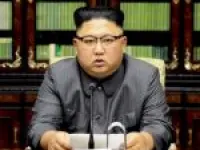
As Kim Jong Un Calls Seoul "Principal Enemy", Tension Raises About Another Inter-Korea War
The tension between North Korea and South Korea has been increasing rapidly lately. Now North Korean leader Kim Jong Un has declared the South as his country’s “principal enemy”, discarded agencies which were dedicated to reunification and outreach, and threatened to wag war over “even 0.001mm” of territorial infringement.
Hong Min, a senior analyst at the Korea Institute for national Unification in Seol said the declaration of Kim Jong Un of South Korea as its “principal enemy” can have major shift as “in the past when there was risk of an armed conflict, there was a back channel to keep it in control, but now there is none of that”. He said, Pyongyang has gotten rid of any inter-Korean mechanism for preventing conflicts from spiralling out of control. He further added that the “principal enemy” label “isn’t just rhetorical – the words could carry into action”.
The North Korean leader said he had no intention of starting a war, but also none avoiding it. He said he will no longer recognize the de facto maritime border between North and South Korea, which is known as Northern Limit Line. His military recently practiced days of live-fire artillery drills in the area. This created a “growing possibility of the two sides getting into a military skirmish, which could lead to a wider conflict”, said Hong Min.
Seoul has warned about a “multiple time stronger” response to any provocation. “it is never wise for both South and North Korea to take a no-prisoners approach in inter-Korea dealings…as North Korea becomes more reckless, we hope that government will focus its efforts…to manage the situation”, read an editorial in the Hankyoreh newspaper.
Earlier, South Korea reported about Pyongyang firing more than 200 rounds of artillery shells from its west coast towards Seoul’s Yeonpyeong island. South Korea condemned the act and called it “provocative”. South Korea’s Defence Minister, Shin Won-sik in a statement said that, “North Korea resuming its artillery fire drills inside the non-hostility zone is an act of provocation which threatens peace on the Korean Peninsula and raises tension”. He also added that Seoul’s military should be ready to “completely wipe out the enemy so that they wouldn’t dare another provocation”.
The new attack came months after Pyongyang suspended a military deal with Seoul, which was aimed at improving the relation between the countries. The deal started to slide down when North Korea claimed about successfully launching a spy satellite into space, which was in November. South Korea called to partly suspend the deal and said that it would resume with surveillance flights along the shared border.
The inter-Korea reconciliation process have long been grim. Since Kim Jong Un now declared Seoul as its number one enemy, “he has not only closed the door to rapprochement, he has put a padlock on it to make it clear to the South Koreans where he stands on their relationship”, told Soo Kim, former CIA analyst, to AFP. She said Kim has been preparing and waiting for an opportunity to conduct his much anticipated seventh nuclear test. “These weapons weren’t developed overnight, and the Kim regime’s plans to use them as tools of coercion, threats, and bargaining have been their modus operandi for decades”, she said.
According to Leif-Eric Easley, a professor at Ewha University in Seoul, Kim Jong Un’s new message to Seoul appear to be “an ideological adjustment for regime survival, justifying Kim’s focus on nuclear missiles”. He said North Koreans are “increasingly aware of their country’s economic failings compared to South Korean successes” despite strict flow of information domestically and years of border closure due to Covis 19 pandemic.
He said Kim might also be trying to politically punish the Yoon administration of South Korea for its policies towards Pyongyang, as South Korea’s President Yoon Suk Yeol’s party is gearing up to win back control of the country’s parliament which through the general election in the coming April.













